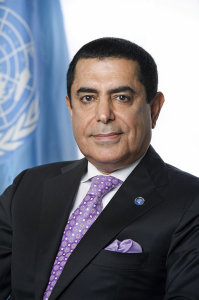The basic question is what does peace and security look like in practice? How would you describe how peace is or should be manifested as behaviours and cultures in the international system, at the levels of the system (including stakeholders), organization, team and individual?
You see, there is the UN Security Council l which deals predominately with peace and security, responding to Chapter 7 of the UN mandate for the council. The other way is that there is the General Assembly which corresponds to Chapter VI,which states that any dispute that is likely to endanger peace and security should first be addressed through negotiation and mediation and states that the Council can call on parties to use such means to settle their dispute. When I was president of the 66th session of the General Assembly, I chose mediation as the main theme. The same session of the UN General Assembly passed resolution 66/291 on strengthening the role of mediation in the peaceful settlement of disputes, conflict prevention and resolution. Currently I preside over another organization that deals with issues relevant to peace and security, the Untied Nations Alliance of Civilizations, which was established after 9/11 as an initiative of the UN Secretary General at the time, and was co-sponsored by Spain and Turkey.
There are three main tools for peace and security. The first is the Security Council, which is mandated for hard power, dealing with military and peace keepers, while the General Assembly uses soft power and mediation. Then there is the Alliance of Civilizations, which is a soft power tool to defuse tensions through bridging cultural gaps and fostering interfaith dialogue and understanding among diverse communities and nations.
 Ambassador Nassir Abdulaziz al-Nasser
Ambassador Nassir Abdulaziz al-Nasser
Since I took the position in leading the Alliance of the Civilizations, I can see that there is a challenge that is growing wherever we go,. The wave of extremism and radicalization is on the rise. Conflict stems from groups like ISIS and Al-Qaeda who use religion to promote their own radical ideologies among young people. We are working on this as a mission for the Alliance, which is focused on four areas (youth, education, media, and migration). Lately and over the past few months, I presented an initiative to the Secretary General and the President of the General Assembly as I noticed that these problems are increasing with many young people being brain washed by radical and extremist groups who persuaded them to join these groups. To address this dangerous problem, military power can be one solution but it’s not enough. You need different tools I am convinced, that religious leaders have a vital role to play. In order to address such cases, we need their input. We also need the collective efforts of governments as well as civil society, academia, scholars, and private sector support.
I presented to the UN Secretary General, Mr. Ban Ki Moon, the initiative to convene a High Level Thematic Debate with religious leaders from all over the world, representing major faiths to meet at the UN and talk about the promotion of tolerance and reconciliation and combating extremism.
The meeting was held at the General Assembly and it was very interesting over all. I feel if we keep working with different ideas and new mechanisms with everyone, it will work out well, as to fight with these groups we have to work smart. And above all we must be positive about our capabilities to combat extremism. The world must have peace and stability. How can I live my life without that? We need a global commitment by all parties to get through this. The threat will be towards humanity, and we know that our world is getting smaller. And we’re dealing with smarter people to fight against so we must be smarter. And I feel religious leaders can really help in doing this.
There is also the role of the media that holds the perception that the UN is a giant dinosaur and a bureaucratic mess. I believe in the mission of UN. I’ve worked with it for 21 years. It’s not an alien as it’s driven by member states and the UN can be effective if there is consensus. Sometimes, when there is disagreement with the big five, nothing happens. We see this in Syria at present. If we have consensus, then we can do it. I believe in the mission of the UN.